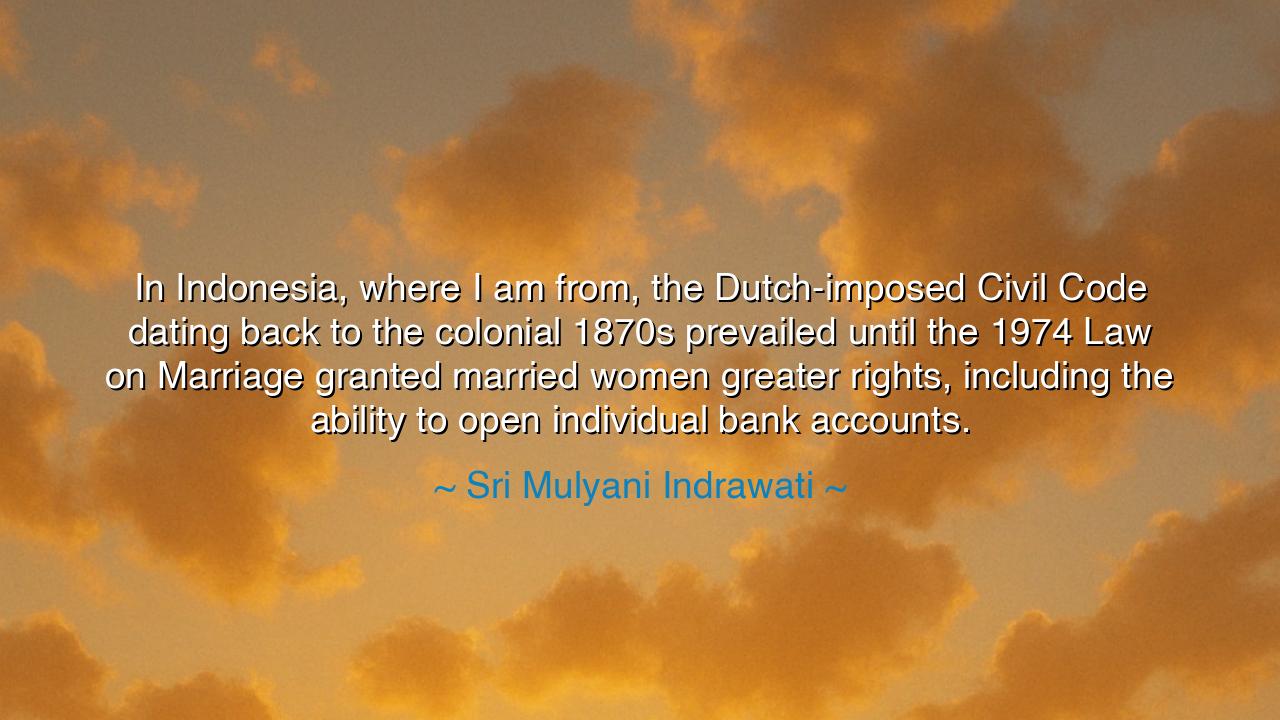
In Indonesia, where I am from, the Dutch-imposed Civil Code
In Indonesia, where I am from, the Dutch-imposed Civil Code dating back to the colonial 1870s prevailed until the 1974 Law on Marriage granted married women greater rights, including the ability to open individual bank accounts.






A stateswoman speaks with the clarity of a bell at dawn: “In Indonesia, where I am from, the Dutch-imposed Civil Code dating back to the colonial 1870s prevailed until the 1974 Law on Marriage granted married women greater rights, including the ability to open individual bank accounts.” In this single sentence lives a century’s weather—the long monsoon of empire, the patient drought of legal delay, and at last a season of reform that lets women hold their own names beside their own savings. The words measure not only statutes but breath: how a rule written far away can sit like a stone upon a household, and how a law at last amended can feel like windows thrown open after years of smoke.
The ancients taught that law is a river that shapes the valley of daily life. Under the Dutch-imposed Civil Code, the current ran narrow: marital power often seated the husband as head and legal proxy, and the wife’s economic will was tethered. In practice, this meant that a woman’s diligence could stock a market stall, her prudence could stretch a family’s rice, and her genius could balance accounts in her head—yet the ledger at the bank might still refuse her signature. Empire was not only forts and ships; it was also forms and signatures that outlived the flag. Thus the 1870s still breathed in the 20th century, long after the rifles were quiet.
Then came the statute like a keystone set at last: the 1974 Law on Marriage. It did not descend from the clouds; it was hammered out by debate, duty, and the lived arguments of countless women whose households proved, each day, their capacity for stewardship. With it arrived a re-tuning of dignity—married women recognized as legal actors in their own right, able to open individual bank accounts, to enter contracts, to let prudence move from kitchen to counter, from market to mortgage. The law did not invent their competence; it finally recognized it.
Recall a story from our shared archipelago of memory: R.A. Kartini, the Javanese noblewoman who wrote letters at the turn of the century, pleading for women’s learning and legal personhood. She died young, but her words walked. Imagine her looking upon a daughter who carries a bankbook in her own name, a small rectangle of paper that says, I am trusted by the law to keep what I earn and to choose how it serves my family. This is the quiet revolution that statutes can midwife: not the noise of banners, but the steady heartbeat of solvency, choice, and respect within the walls of a home.
The quote’s origin is thus double: historical and personal. Historical, because it names the long shadow of colonial jurisprudence upon Indonesia; personal, because it is spoken by one—Sri Mulyani Indrawati—whose life in public finance has read the nation’s books and knows that prosperity begins where women are free to steer their own accounts. In nations and households alike, balance sheets tell moral stories. When the law keeps a woman from banking her future, the whole village borrows on worse terms.
What lesson, then, should we carve upon the lintel of our time? That independence is not abstraction. The right to an individual bank account is a lamp that lights many rooms: safety from sudden storms, courage to start a shop, leverage to negotiate fairly at home, an inheritance written in more than whispers. Where the rights of women are firm, children eat deeper, neighbors borrow kinder, and the street grows safer—because power shared is power stabilized. Law, rightly tuned, becomes a lattice that vines of talent can climb.
Practical rites for the road: (1) Guard your legal identity—keep documents current, know the accounts that bear your name, and insist on your own signatures. (2) Build a two-tier nest: a joint household fund for common life and an individual reserve for resilience; review both as regularly as prayer. (3) Teach the young—sons and daughters—how budgets speak, how interest works, how a contract binds; let literacy of money be part of their civic grammar. (4) Where law still lags, organize: ask your councils for reforms that protect spousal consent without erasing spousal agency. In this way, the long arc that bent from the 1870s to 1974 will keep bending toward a future in which ability, not permission, decides whether a woman may sign for her own tomorrow.






AAdministratorAdministrator
Welcome, honored guests. Please leave a comment, we will respond soon